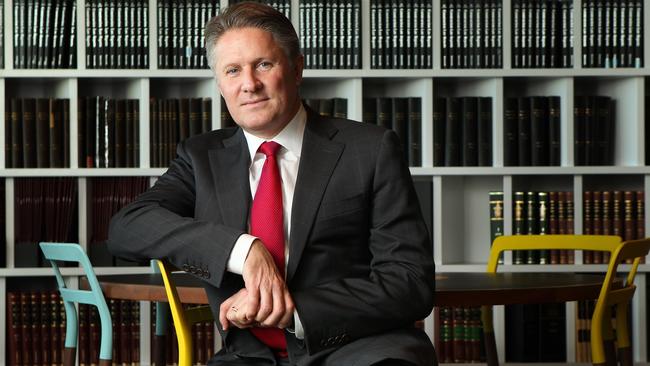2019 CEO Survey: Mark Rigotti, Herbert Smith Freehills
Australia needs to follow Europe’s lead on renewables, says Mark Rigotti.

Every year The Australian’s John Durie asks some of the biggest names in Australian business five key questions about what’s coming in the year ahead.
READ MORE: John Durie’s 2019 CEO Survey.
How is your company affected by low-interest rates and what is needed to boost the economy?
We are a global professional services firm. Low-interest rates affect our clients and our business. Our clients access more and cheaper debt in a low-interest environment, subject to all other conditions being equal. However, our experience is that low-interest rates in themselves do not promote more transactional activity – currency, macro-economic conditions and sector headwinds and tailwinds are far more relevant. In terms of our business, our borrowing costs are cheaper – but we don’t like debt and tend to reduce it – so low rates don’t really impact us. However, while interest rates do have broader economic effects, it strikes me that the Australian economy would be well served by increased spending on long-term and medium-term assets like infrastructure and energy transition to offset any flatness in the economy.
What is the impact of government regulations on your company, including those applying to the financial sector?
In Australia, we are self-regulated by the Law Society. Government regulations do not impact our business per se in Australia. This is different in other jurisdictions. Europe is reasonably open with the local regulatory authorities (and the government oversight) enabling us to operate in those countries. It is a different story in Asia where we have nine offices but can only advise on local law in two. In some jurisdictions, we cannot operate in our own name and have to operate via joint ventures. Thus, government regulations outside Australia are more restrictive and less open. That means that we tend to be quarterbacking international deals rather than doing local law in those more closed environments. In Australia, the lack of harmonisation of state-based regulations across the legal profession creates major inefficiencies. The Large Law Firm Group has been trying to address this for many years, but it requires federal government intervention which has not been forthcoming to date.
What percentage of company revenues are spent on research and development, and how is your company using technology to improve performance?
I’m not sure how much of our revenues are spent on straight research and development. In our business, research and development spend is for the most part embedded as part of “business as usual spend” where each of the businesses needs to develop and so has an allocation in the operating budget. Perhaps the exception is in our near-shoring operation (called ALT) (which is a low-cost alternative to a traditional law firm) where we are spending some money on technology. The main ways we are using technology to improve our performance is:
● Document automation;
● Processing massive amounts of data, for example, vendor due diligence or
court-based discovery;
● Mining data via predictive coding; and
● Accelerating analysis and decision-making across key areas like anti-money
laundering
What are the three major policy issues facing the country and what should be done about them?
I think this might be beyond my pay grade! However, as an Australian living abroad and looking back into Australia, I’d make the following observations:
● Australia has an almost limitless energy supply, yet it has one of the highest energy costs in the world. Low energy costs enable economic productivity. It amazes me that this cannot be sorted out. It requires federal government intervention and a single energy market framework. Cheaper energy prices will attract investment and ensure prosperity with extra jobs and profits benefiting all Australians. Number 1 would be the creation of sustainable cheaper energy sources.
● Climate change is here. The Europeans have really taken this on board and are well down the path to energy transition. Notwithstanding the influence of coal on the Australian economy, it would bode well for Australia to follow the European lead (see countries like Denmark, for example) and step up aggressively into sustainable energy transition.
● Growth. The country needs to grow off the back of population growth, competitiveness and productivity. The trifecta of population growth, improved competitiveness and productivity improvement should be a major objective of government in collaboration with business and community organisations like trade unions. Not getting this right embeds inefficiencies, non-competitive practices and is a major turn off for international agnostic capital.
What are the major impediments to long-term growth facing your company and what can or is being done about them?
The market sets compensation levels for our people. Those compensation levels are rising at a faster rate than our revenue increases. This impedes growth and produces margin pressure absent increased market share. This is an issue for us. More modern and future workforce strategies are required to address this.



